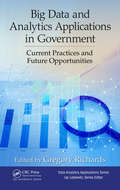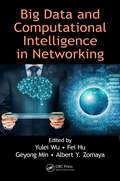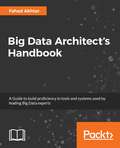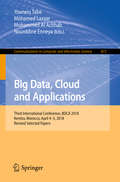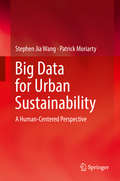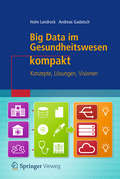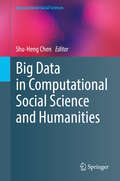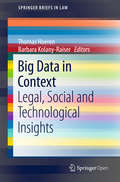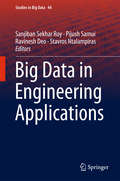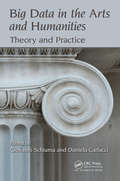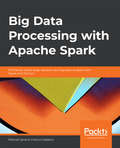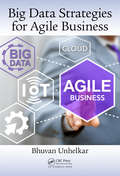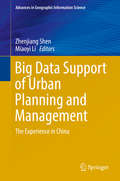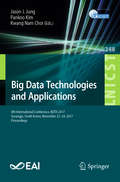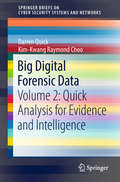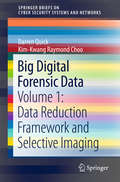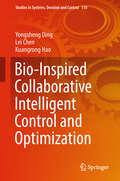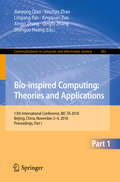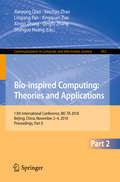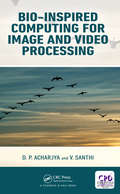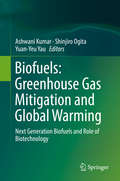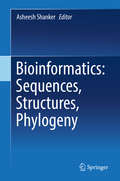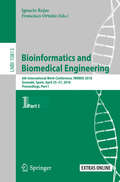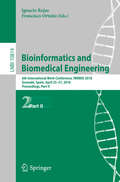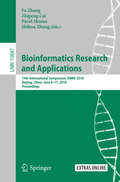- Table View
- List View
Big Data and Analytics Applications in Government: Current Practices and Future Opportunities (Data Analytics Applications)
by Gregory RichardsWithin this context, big data analytics (BDA) can be an important tool given that many analytic techniques within the big data world have been created specifically to deal with complexity and rapidly changing conditions. The important task for public sector organizations is to liberate analytics from narrow scientific silos and expand it across internally to reap maximum benefit across their portfolios of programs. This book highlights contextual factors important to better situating the use of BDA within government organizations and demonstrates the wide range of applications of different BDA techniques. It emphasizes the importance of leadership and organizational practices that can improve performance. It explains that BDA initiatives should not be bolted on but should be integrated into the organization’s performance management processes. Equally important, the book includes chapters that demonstrate the diversity of factors that need to be managed to launch and sustain BDA initiatives in public sector organizations.
Big Data and Computational Intelligence in Networking
by Yulei Wu Fei Hu Geyong Min Albert Y. ZomayaThis book presents state-of-the-art solutions to the theoretical and practical challenges stemming from the leverage of big data and its computational intelligence in supporting smart network operation, management, and optimization. In particular, the technical focus covers the comprehensive understanding of network big data, efficient collection and management of network big data, distributed and scalable online analytics for network big data, and emerging applications of network big data for computational intelligence.
Big Data Architect’s Handbook: A guide to building proficiency in tools and systems used by leading big data experts
by Syed Muhammad AkhtarA comprehensive end-to-end guide that gives hands-on practice in big data and Artificial IntelligenceKey FeaturesLearn to build and run a big data application with sample codeExplore examples to implement activities that a big data architect performsUse Machine Learning and AI for structured and unstructured dataBook DescriptionThe big data architects are the “masters” of data, and hold high value in today’s market. Handling big data, be it of good or bad quality, is not an easy task. The prime job for any big data architect is to build an end-to-end big data solution that integrates data from different sources and analyzes it to find useful, hidden insights.Big Data Architect’s Handbook takes you through developing a complete, end-to-end big data pipeline, which will lay the foundation for you and provide the necessary knowledge required to be an architect in big data. Right from understanding the design considerations to implementing a solid, efficient, and scalable data pipeline, this book walks you through all the essential aspects of big data. It also gives you an overview of how you can leverage the power of various big data tools such as Apache Hadoop and ElasticSearch in order to bring them together and build an efficient big data solution.By the end of this book, you will be able to build your own design system which integrates, maintains, visualizes, and monitors your data. In addition, you will have a smooth design flow in each process, putting insights in action.What you will learn Learn Hadoop Ecosystem and Apache projects Understand, compare NoSQL database and essential software architecture Cloud infrastructure design considerations for big data Explore application scenario of big data tools for daily activities Learn to analyze and visualize results to uncover valuable insights Build and run a big data application with sample code from end to end Apply Machine Learning and AI to perform big data intelligence Practice the daily activities performed by big data architectsWho this book is forBig Data Architect’s Handbook is for you if you are an aspiring data professional, developer, or IT enthusiast who aims to be an all-round architect in big data. This book is your one-stop solution to enhance your knowledge and carry out easy to complex activities required to become a big data architect.
Big Data, Cloud and Applications: Third International Conference, Bdca 2018, Kenitra, Morocco, April 4-5, 2018, Revised Selected Papers (Communications In Computer And Information Science #872)
by Youness Tabii Mohamed Lazaar Mohammed Al Achhab Nourddine EnneyaThis book constitutes the thoroughly refereed proceedings of the Third International Conference on Big Data, Cloud and Applications, BDCA 2018, held in Kenitra, Morocco, in April 2018.The 45 revised full papers presented in this book were carefully selected from 99 submissions with a thorough double-blind review process. They focus on the following topics: big data, cloud computing, machine learning, deep learning, data analysis, neural networks, information system and social media, image processing and applications, and natural language processing.
Big Data for Urban Sustainability
by Stephen Jia Wang Patrick MoriartyThis book presents a practical framework for the application of big data, cloud, and pervasive and complex systems to sustainable solutions for urban environmental challenges. It covers the technologies, potential, and possible and impact of big data on energy efficiency and the urban environment.The book first introduces key aspects of big data, cloud services, pervasive computing, and mobile technologies from a pragmatic design perspective, including sample open source firmware. Cloud services, mobile and embedded platforms, interfaces, operating system design methods, networking, and middleware are all considered. The authors then explore in detail the framework, design principles, architecture and key components of developing energy systems to support sustainable urban environments. The included case study provides a pathway to improve the eco-efficiency of urban transport, demonstrating how to design an energy efficient next generation urban navigation system by leveraging vast cloud data sets on user-behavior. Ultimately, this resource maps big data’s pivotal intersection with rapid global urbanization along the path to a sustainable future.
Big Data im Gesundheitswesen kompakt: Konzepte, Lösungen, Visionen (It Kompakt Ser.)
by Holm Landrock Andreas GadatschDas kompakte Fachbuch gibt einen Überblick über die Möglichkeiten von „Big Data“ im Gesundheitswesen und beschreibt anhand von ausgewählten Szenarien mögliche Einsatzgebiete.Die Autoren erläutern zentrale Systemkomponenten und IT-Standards und thematisieren anhand wichtiger Daten des Gesundheitswesens die Notwendigkeit der Strukturierung und Modellierung von Daten. Das Buch gibt Hinweise wie Geschäftsprozesse im Gesundheitswesen dokumentiert, analysiert und verbessert werden können. Anwendungsszenarien, wie die Datenanalysen für Krankenhäuser, Labore, Versicherungen und die Pharmaindustrie, zeigen die praktische Relevanz des Themas. Aber auch rechtliche und ethische Aspekte werden inhaltlich angeschnitten.Ein Buch für Entscheider in der medizinischen Leitung und Verwaltung von Krankenhäusern, Fachleute sowie niedergelassene Ärzte und Apotheker, aber auch Personen in Ausbildung und Studium im Gesundheitswesen.
Big Data in Computational Social Science and Humanities (Computational Social Sciences)
by Shu-Heng ChenThis edited volume focuses on big data implications for computational social science and humanities from management to usage. The first part of the book covers geographic data, text corpus data, and social media data, and exemplifies their concrete applications in a wide range of fields including anthropology, economics, finance, geography, history, linguistics, political science, psychology, public health, and mass communications. The second part of the book provides a panoramic view of the development of big data in the fields of computational social sciences and humanities. The following questions are addressed: why is there a need for novel data governance for this new type of data?, why is big data important for social scientists?, and how will it revolutionize the way social scientists conduct research? With the advent of the information age and technologies such as Web 2.0, ubiquitous computing, wearable devices, and the Internet of Things, digital society has fundamentally changed what we now know as "data", the very use of this data, and what we now call "knowledge". Big data has become the standard in social sciences, and has made these sciences more computational. Big Data in Computational Social Science and Humanities will appeal to graduate students and researchers working in the many subfields of the social sciences and humanities.
Big Data in Context: Legal, Social and Technological Insights (SpringerBriefs in Law)
by Thomas Hoeren Barbara Kolany-RaiserThis book is open access under a CC BY 4. 0 license. This book sheds new light on a selection of big data scenarios from an interdisciplinary perspective. It features legal, sociological and economic approaches to fundamental big data topics such as privacy, data quality and the ECJ's Safe Harbor decision on the one hand, and practical applications such as smart cars, wearables and web tracking on the other. Addressing the interests of researchers and practitioners alike, it provides a comprehensive overview of and introduction to the emerging challenges regarding big data. All contributions are based on papers submitted in connection with ABIDA (Assessing Big Data), an interdisciplinary research project exploring the societal aspects of big data and funded by the German Federal Ministry of Education and Research. This volume was produced as a part of the ABIDA project (Assessing Big Data, 01IS15016A-F). ABIDA is a four-year collaborative project funded by the Federal Ministry of Education and Research. However the views and opinions expressed in this book reflect only the authors' point of view and not necessarily those of all members of the ABIDA project or the Federal Ministry of Education and Research.
Big Data in Engineering Applications (Studies in Big Data #44)
by Sanjiban Sekhar Roy Pijush Samui Ravinesh Deo Stavros NtalampirasThis book presents the current trends, technologies, and challenges in Big Data in the diversified field of engineering and sciences. It covers the applications of Big Data ranging from conventional fields of mechanical engineering, civil engineering to electronics, electrical, and computer science to areas in pharmaceutical and biological sciences. This book consists of contributions from various authors from all sectors of academia and industries, demonstrating the imperative application of Big Data for the decision-making process in sectors where the volume, variety, and velocity of information keep increasing. The book is a useful reference for graduate students, researchers and scientists interested in exploring the potential of Big Data in the application of engineering areas.
Big Data in the Arts and Humanities: Theory and Practice (Data Analytics Applications)
by Giovanni Schiuma Daniela CarlucciAs digital technologies occupy a more central role in working and everyday human life, individual and social realities are increasingly constructed and communicated through digital objects, which are progressively replacing and representing physical objects. They are even shaping new forms of virtual reality. This growing digital transformation coupled with technological evolution and the development of computer computation is shaping a cyber society whose working mechanisms are grounded upon the production, deployment, and exploitation of big data. In the arts and humanities, however, the notion of big data is still in its embryonic stage, and only in the last few years, have arts and cultural organizations and institutions, artists, and humanists started to investigate, explore, and experiment with the deployment and exploitation of big data as well as understand the possible forms of collaborations based on it. Big Data in the Arts and Humanities: Theory and Practice explores the meaning, properties, and applications of big data. This book examines therelevance of big data to the arts and humanities, digital humanities, and management of big data with and for the arts and humanities. It explores the reasons and opportunities for the arts and humanities to embrace the big data revolution. The book also delineates managerial implications to successfully shape a mutually beneficial partnership between the arts and humanities and the big data- and computational digital-based sciences. Big data and arts and humanities can be likened to the rational and emotional aspects of the human mind. This book attempts to integrate these two aspects of human thought to advance decision-making and to enhance the expression of the best of human life.
Big Data Processing with Apache Spark: Efficiently tackle large datasets and big data analysis with Spark and Python
by Manuel Ignacio Franco GaleanoNo need to spend hours ploughing through endless data – let Spark, one of the fastest big data processing engines available, do the hard work for you.Key FeaturesGet up and running with Apache Spark and PythonIntegrate Spark with AWS for real-time analyticsApply processed data streams to machine learning APIs of Apache SparkBook DescriptionProcessing big data in real time is challenging due to scalability, information consistency, and fault-tolerance. This book teaches you how to use Spark to make your overall analytical workflow faster and more efficient. You'll explore all core concepts and tools within the Spark ecosystem, such as Spark Streaming, the Spark Streaming API, machine learning extension, and structured streaming.You'll begin by learning data processing fundamentals using Resilient Distributed Datasets (RDDs), SQL, Datasets, and Dataframes APIs. After grasping these fundamentals, you'll move on to using Spark Streaming APIs to consume data in real time from TCP sockets, and integrate Amazon Web Services (AWS) for stream consumption.By the end of this book, you’ll not only have understood how to use machine learning extensions and structured streams but you’ll also be able to apply Spark in your own upcoming big data projects.What you will learnWrite your own Python programs that can interact with SparkImplement data stream consumption using Apache SparkRecognize common operations in Spark to process known data streamsIntegrate Spark streaming with Amazon Web Services (AWS)Create a collaborative filtering model with the movielens datasetApply processed data streams to Spark machine learning APIsWho this book is forData Processing with Apache Spark is for you if you are a software engineer, architect, or IT professional who wants to explore distributed systems and big data analytics. Although you don‘t need any knowledge of Spark, prior experience of working with Python is recommended.
Big Data Strategies for Agile Business
by Bhuvan UnhelkarAgile is a set of values, principles, techniques, and frameworks for the adaptable, incremental, and efficient delivery of work. Big Data is a rapidly growing field that encompasses crucial aspects of data such as its volume, velocity, variety, and veracity. This book outlines a strategic approach to Big Data that will render a business Agile. It discusses the important competencies required to streamline and focus on the analytics and presents a roadmap for implementing such analytics in business.
Big Data Support of Urban Planning and Management: The Experience in China (Advances in Geographic Information Science)
by Zhenjiang Shen Miaoyi LiIn the era of big data, this book explores the new challenges of urban-rural planning and management from a practical perspective based on a multidisciplinary project. Researchers as contributors to this book have accomplished their projects by using big data and relevant data mining technologies for investigating the possibilities of big data, such as that obtained through cell phones, social network systems and smart cards instead of conventional survey data for urban planning support. This book showcases active researchers who share their experiences and ideas on human mobility, accessibility and recognition of places, connectivity of transportation and urban structure in order to provide effective analytic and forecasting tools for smart city planning and design solutions in China.
Big Data Technologies and Applications: 8th International Conference, BDTA 2017, Gwangju, South Korea, November 23–24, 2017, Proceedings (Lecture Notes of the Institute for Computer Sciences, Social Informatics and Telecommunications Engineering #248)
by Jason J. Jung Pankoo Kim Kwang Nam ChoiThis book constitutes the refereed post-conference proceedings of the 8th International Conference on Big Data Technologies and Applications, BDTA 2017, held in Gwangju, South Korea, in November 2017. The 15 revised full papers were carefully reviewed and selected from 25 submissions and handle theoretical foundations and practical applications which premise the new generation of data analytics and engineering. The contributions deal with following topics: privacy and security, image processing, context awareness, s/w engineering and e-commerce, social media and health care.
Big Digital Forensic Data: Volume 2: Quick Analysis for Evidence and Intelligence (SpringerBriefs on Cyber Security Systems and Networks)
by Darren Quick Kim-Kwang Raymond ChooThis book provides an in-depth understanding of big data challenges to digital forensic investigations, also known as big digital forensic data. It also develops the basis of using data mining in big forensic data analysis, including data reduction, knowledge management, intelligence, and data mining principles to achieve faster analysis in digital forensic investigations. By collecting and assembling a corpus of test data from a range of devices in the real world, it outlines a process of big digital forensic data analysis for evidence and intelligence. It includes the results of experiments on vast volumes of real digital forensic data. The book is a valuable resource for digital forensic practitioners, researchers in big data, cyber threat hunting and intelligence, data mining and other related areas.
Big Digital Forensic Data: Volume 2: Quick Analysis For Evidence And Intelligence (SpringerBriefs On Cyber Security Systems And Networks)
by Kim-Kwang Raymond Choo Darren QuickThis book provides an in-depth understanding of big data challenges to digital forensic investigations, also known as big digital forensic data. It also develops the basis of using data mining in big forensic data analysis, including data reduction, knowledge management, intelligence, and data mining principles to achieve faster analysis in digital forensic investigations. By collecting and assembling a corpus of test data from a range of devices in the real world, it outlines a process of big data reduction, and evidence and intelligence extraction methods. Further, it includes the experimental results on vast volumes of real digital forensic data. The book is a valuable resource for digital forensic practitioners, researchers in big data, cyber threat hunting and intelligence, data mining and other related areas.
Bio-Inspired Collaborative Intelligent Control and Optimization (Studies in Systems, Decision and Control #118)
by Lei Chen Yongsheng Ding Kuangrong HaoThis book presents state-of-the-art research advances in the field of biologically inspired cooperative control theories and their applications. It describes various biologically inspired cooperative control and optimization approaches and highlights real-world examples in complex industrial processes. Multidisciplinary in nature and closely integrating theory and practice, the book will be of interest to all university researchers, control engineers and graduate students in intelligent systems and control who wish to learn the core principles, methods, algorithms, and applications.
Bio-inspired Computing: 13th International Conference, BIC-TA 2018, Beijing, China, November 2–4, 2018, Proceedings, Part I (Communications in Computer and Information Science #951)
by Jianyong Qiao Xinchao Zhao Linqiang Pan Xingquan Zuo Xingyi Zhang Qingfu Zhang Shanguo HuangThis two-volume set (CCIS 951 and CCIS 952) constitutes the proceedings of the 13th International Conference on Bio-inspired Computing: Theories and Applications, BIC-TA 2018, held in Beijing, China, in November 2018.The 88 full papers presented in both volumes were selected from 206 submissions. The papers deal with studies abstracting computing ideas such as data structures, operations with data, ways to control operations, computing models from living phenomena or biological systems such as evolution, cells, neural networks, immune systems, swarm intelligence.
Bio-inspired Computing: 13th International Conference, BIC-TA 2018, Beijing, China, November 2–4, 2018, Proceedings, Part II (Communications in Computer and Information Science #952)
by Jianyong Qiao Xinchao Zhao Linqiang Pan Xingquan Zuo Xingyi Zhang Qingfu Zhang Shanguo HuangThis two-volume set (CCIS 951 and CCIS 952) constitutes the proceedings of the 13th International Conference on Bio-inspired Computing: Theories and Applications, BIC-TA 2018, held in Beijing, China, in November 2018.The 88 full papers presented in both volumes were selected from 206 submissions. The papers deal with studies abstracting computing ideas such as data structures, operations with data, ways to control operations, computing models from living phenomena or biological systems such as evolution, cells, neural networks, immune systems, swarm intelligence.
Bio-Inspired Computing for Image and Video Processing
by D. P. Acharjya V. SanthiIn recent years bio-inspired computational theories and tools have developed to assist people in extracting knowledge from high dimensional data. These differ in how they take a more evolutionary approach to learning, as opposed to traditional artificial intelligence (AI) and what could be described as 'creationist' methods. Instead bio-inspired computing takes a bottom-up, de-centralized approach that often involves the method of specifying a set of simple rules, a set of simple organisms which adhere to those rules, and of iteratively applying those rules. Bio-Inspired Computing for Image and Video Processing covers interesting and challenging new theories in image and video processing. It addresses the growing demand for image and video processing in diverse application areas, such as secured biomedical imaging, biometrics, remote sensing, texture understanding, pattern recognition, content-based image retrieval, and more. This book is perfect for students following this topic at both undergraduate and postgraduate level. It will also prove indispensable to researchers who have an interest in image processing using bio-inspired computing.
Biofuels: Greenhouse Gas Mitigation and Global Warming
by Ashwani Kumar Shinjiro Ogita Yuan-Yeu YauThis timely book is a compilation of edited articles by distinguished international scientists discussing global warming, its causes as well as present and future solutions. Social and economic growth at global level is measured in terms of GDP, which requires energy inputs generally based on fossil fuel resources. These, however, are major contributors to increasing levels of CO2, causing 15 tonnes of green house gas emissions per capita. Renewable sources of energy offer an alternative to fossil fuels, and would help reduce this to the 2 tonnes of greenhouse gas emissions per capita per annum needed to achieve sustainable growth. As such, the book discusses the next-generation of biofuels and all related aspects, based on the editors’ significant investigations on biofuels over the last 30 years. It also presents the latest research findings from research work carried out by contemporary researchers. Presenting global biofuel perspectives, it examines various issues related to sustainable development of biofuels in the contexts of agriculture, forestry, industry and economic growth. It covers the 1st to 4th generation biofuels, as well as the status of biofuel resources and their potential in carbon neutral economy. Offering a comprehensive, state-of-art overview of current and future biofuels at local and global levels, this book appeals to administrators, policy makers, universities and research institutions.
Bioinformatics: Sequences, Structures, Phylogeny
by Asheesh ShankerThis book provides a comprehensive overview of the concepts and approaches used for sequence, structure, and phylogenetic analysis. Starting with an introduction to the subject and intellectual property protection for bioinformatics, it guides readers through the latest sequencing technologies, sequence analysis, genomic variations, metagenomics, epigenomics, molecular evolution and phylogenetics, structural bioinformatics, protein folding, structure analysis and validation, drug discovery, reverse vaccinology, machine learning, application of R programming in biological data analysis, and the use of Linux in handling large data files.
Bioinformatics and Biomedical Engineering: 6th International Work-Conference, IWBBIO 2018, Granada, Spain, April 25–27, 2018, Proceedings, Part I (Lecture Notes in Computer Science #10813)
by Ignacio Rojas Francisco OrtuñoThis two-volume set LNBI 10813 and LNBI 10814 constitutes the proceedings of the 6th International Work-Conference on Bioinformatics and Biomedical Engineering, IWBBIO 2018, held in Granada, Spain, in April 2018.The 88 regular papers presented were carefully reviewed and selected from 273 submissions. The scope of the conference spans the following areas: bioinformatics for healthcare and diseases; bioinformatics tools to integrate omics dataset and address biological question; challenges and advances in measurement and self-parametrization of complex biological systems; computational genomics; computational proteomics; computational systems for modelling biological processes; drug delivery system design aided by mathematical modelling and experiments; generation, management and biological insights from big data; high-throughput bioinformatic tools for medical genomics; next generation sequencing and sequence analysis; interpretable models in biomedicine and bioinformatics; little-big data. Reducing the complexity and facing uncertainty of highly underdetermined phenotype prediction problems; biomedical engineering; biomedical image analysis; biomedical signal analysis; challenges in smart and wearable sensor design for mobile health; and healthcare and diseases.
Bioinformatics and Biomedical Engineering: 6th International Work-Conference, IWBBIO 2018, Granada, Spain, April 25–27, 2018, Proceedings, Part II (Lecture Notes in Computer Science #10814)
by Ignacio Rojas Francisco OrtuñoThis two volume set LNBI 10813 and LNBI 10814 constitutes the proceedings of the 6th International Work-Conference on Bioinformatics and Biomedical Engineering, IWBBIO 2018, held in Granada, Spain, in April 2018.The 88 regular papers presented were carefully reviewed and selected from 273 submissions. The scope of the conference spans the following areas: bioinformatics for healthcare and diseases; bioinformatics tools to integrate omics dataset and address biological question; challenges and advances in measurement and self-parametrization of complex biological systems; computational genomics; computational proteomics; computational systems for modelling biological processes; drug delivery system design aided by mathematical modelling and experiments; generation, management and biological insights from big data; high-throughput bioinformatic tools for medical genomics; next generation sequencing and sequence analysis; interpretable models in biomedicine and bioinformatics; little-big data. Reducing the complexity and facing uncertainty of highly underdetermined phenotype prediction problems; biomedical engineering; biomedical image analysis; biomedical signal analysis; challenges in smart and wearable sensor design for mobile health; and healthcare and diseases.
Bioinformatics Research and Applications: 14th International Symposium, ISBRA 2018, Beijing, China, June 8-11, 2018, Proceedings (Lecture Notes in Computer Science #10847)
by Pavel Skums Zhipeng Cai Fa Zhang Shihua ZhangThis book constitutes the proceedings of the 14th International Conference on Bioinformatics Research and Applications, ISBRA 2018, held in Beijing, China, in June 2018.The 24 full and 10 short papers presented in this volume were carefully reviewed and selected from a total of 138 submissions. They were organized in topical sections named: network analysis and modelling; genomic data analysis; cancer data analysis; structure and interaction; HPC and CryoEM; machine and deep learning; data analysis and methodology; analysis and visualization tools; and RNA-Seq data analysis.
